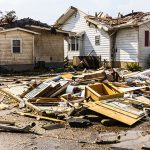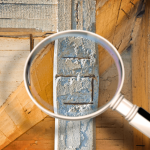What Can I Do If Someone Destroys My Property?
Both property damage and the destruction of property are serious crimes that can be costly to repair and take an emotional toll on the victim. No one should have to deal with their property being damaged or destroyed, but unfortunately, it does happen due to natural causes, negligence, or intentional destruction.
If you’ve been the victim of property destruction, no matter how it occurred, there are steps you can take and help you can get to recover and get back to your everyday life.
Property Damage vs. Property Destruction
Before we discuss what steps to take, we want to clarify the difference between property damage vs. property destruction, as they are not the same thing. Understanding the difference can help you as you take steps to repair or replace your property.
Property Damage
Property damage involves damage to your real or personal property. Real property includes your land or home. Personal property includes personal possessions like your car, laptop, or jewelry. The clothing in your wardrobe, the dishes in your kitchen cabinets, and the tools in your shed box are all examples of personal property.
Property damage usually results from natural causes, such as wind, fire, hail, flooding, and freezing. These events are all outside of your control but can wreak havoc on your home.
However, property damage can also occur from theft or negligence. Theft is an intentional act, while negligence is usually a lack of deliberate action that would have prevented the damage.
Destruction of Property
Property destruction is a criminal act that involves intentionally damaging another person’s property. Keying a car is an example of the destruction of property. This differs from negligence since destroying property is intentional, while negligence is usually due to a lack of care.
It also differs from theft since most thieves are stealing property, not damaging it. Any damage left behind is usually an unintentional byproduct of theft.
Now that we’ve explained the difference let’s discuss what you can do if your property has been damaged or destroyed. We’re including both in this article since the steps toward recovery are much the same.
Steps to Take
- Document Evidence. Photos and videos of the damage to your property are the best way to document what happened. Take photos from every angle to document the full extent of the damage. An up-close is good, but it’s not enough to fully show what happened.
If you’re dealing with the destruction of property and you know who caused the damage, document evidence of that. Without evidence beyond a reasonable doubt, you won’t have proof to bring the perpetrator to justice.
You might not have a before photo of how your property looked, but it’s a bonus if you do here. Many of us take photos of our prized possessions to show on social media, so it might be worth going through your archives to see if you have any pictures if you can’t find them anywhere else.
Either way, document all the evidence you can to prove what happened in hopes that you’ll be compensated for the damage, whether that’s through insurance or in the courtroom.
- Contact an Attorney. You’ll want to contact an attorney for legal help, especially if you aren’t sure what steps to take after documenting your evidence. An attorney can tell you what your next best steps are after reviewing all the evidence you have.
If you have the evidence necessary to prove that your property was intentionally destroyed, the attorney can help you navigate the court system to pursue compensation for the damages. They can also help you press charges against the individual responsible for the destruction of property.
An attorney can also tell you if you don’t have the evidence necessary to press charges and receive compensation through the courts. In that case, your best bet is to go through your insurance company if you have insurance to cover property damage.
- Contact Your Insurance Company. If you have property damage coverage and you can’t receive compensation in court for the damage, or if you’re dealing with property damage (not destruction), contacting your insurance provider is your next best step to recover your property or be compensated for what you’ve lost.
Your insurance company will need all the evidence you’ve documented to assess the damage. In some cases, your property might be repairable. Other times, it will need to be replaced entirely.
Your insurance company will send an insurance adjuster to your home to look at the damage and determine how much to compensate you. This will depend on how bad the damage is and what your policy covers.
We highly recommend purchasing an insurance premium that matches what your personal and real property are worth. That way, your worst-case scenario has a happy ending, and you can repair or replace your belongings.
This may involve having multiple insurance policies since the damage from floods and earthquakes is not included in homeowners’ insurance.
Contact Hudson Douglas Public Adjusters
Dealing with any type of property damage or destruction is a nightmare. What’s worse is when your insurance company won’t work with you to cover the damage.
You’re paying for that coverage, so you’re entitled to receive it, right?
Right!
And that’s why Hudson Douglas Public Adjusters is here to help. In fact, we’re here solely to help you.
Instead of negotiating with your insurance company to settle with you, we negotiate on your behalf with the insurance company to get you everything you’re entitled to through your policy. That includes reading the fine print of your policy.
So, if you need help navigating insurance after your property has been damaged, Hudson Douglas Public Adjusters is here for you. We offer our services – including a free, no-obligation claim – to customers in Arizona, Utah, Nevada, Colorado, New Mexico, Pennsylvania, and New Jersey. Contact us today to get started.




